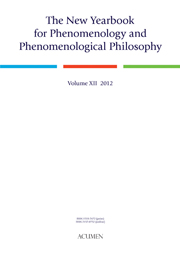Book contents
- Frontmatter
- Contents
- Articles
- Documents
- Edmund Husserl's Philosophy of Arithmetic in Reviews
- “The Logical and Historical Element in Hegel's Philosophy”: Inaugural Dissertation for the attainment of the Degree of Doctor of the Philosophical Faculty at the University of Marburg
- The Work of Philosophy
- In Review
Edmund Husserl's Philosophy of Arithmetic in Reviews
from Documents
- Frontmatter
- Contents
- Articles
- Documents
- Edmund Husserl's Philosophy of Arithmetic in Reviews
- “The Logical and Historical Element in Hegel's Philosophy”: Inaugural Dissertation for the attainment of the Degree of Doctor of the Philosophical Faculty at the University of Marburg
- The Work of Philosophy
- In Review
Summary
Abstract: This present collection of (translations of) reviews is intended to help obtain a more balanced picture of the reception and impact of Edmund Husserl's first book, the 1891 Philosophy of Arithmetic. One of the insights to be gained from this non-exhaustive collection of reviews is that the Philosophy of Arithmetic had a much more widespread reception than hitherto assumed: in the present collection alone there already are fourteen, all published between 1891 and 1895. Three of the reviews appeared in mathematical journals (Jahrbuch über die Fortschritte der Mathematik, Zeitschrift für Mathematik und Physik, and Zeitschrift für mathematischen und naturwissenschaftlichen Unterricht), three were published in English journals (The Philosophical Review, The Monist, Mind), two were written by other members of the School of Brentano (Franz Hillebrand and Alois Höfler). Some of the reviews and notices appear to be very superficial, consisting merely of paraphrases (often without references) and lists of topics taken from the table of contents, presenting barely acceptable summaries. Others, among which Höfler might be the most significant, engage much more deeply with the topics and problems that Husserl addresses, analyzing his approach in the context of the mathematics of his time and the School of Brentano.
Keywords: Edmund Husserl, philosophy of arithmetic, philosophy of mathematics, history of philosophy, history of mathematics
- Type
- Chapter
- Information
- Publisher: Acumen PublishingPrint publication year: 2013



